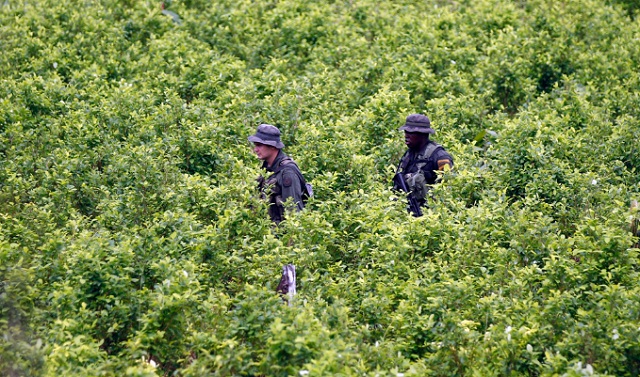
Vienna, Austria | AFP | The UN and Bogota signed a major pact Friday to uproot Colombia’s booming cocaine business, as part of ongoing peace efforts between the government and drug trade-controlling rebels.
The deal worth $315 million dollars (270 million euros) aims to wean farmers off growing coca — the raw material for cocaine — by replacing it with safer crops like coffee and cacao.
The Vienna-based Office on Drugs and Crime (UNODC) said it was an initiative to free rural communities from the clutches of drug dealers.
Colombia is ranked by the United Nations as the world’s biggest producer of coca.
Its growing area rose by a staggering 52 percent to 146,000 hectares (361,000 acres) last year.
“This historical agreement is a unique opportunity to turn the tide against Colombia’s coca cultivation and help farmers embrace alternative development,” UNODC head Yury Fedotov said in a statement.
Colombia’s special post-conflict envoy Rafael Pardo Rueda hailed the project as “fundamental” for the implementation of a historic peace deal sealed in June between Bogota and the Revolutionary Armed Forces of Colombia (FARC).
For decades the drug trade funded the FARC, the country’s largest rebel group, which controlled key regions where coca leaf and cocaine production flourished.
Under the accord, the rebels agreed to disarm and help weed out coca by encouraging farmers to switch to other forms of agriculture.
In exchange, the UN established a new mission in Colombia to help thousands of former FARC combatants return to mainstream society.
The state also promised incentives to growers opting out of the coca business.
But progress has been slow as ex-rebels struggle to reintegrate, leaving them tempted to join other dissident groups, keep their weapons, and traffic drugs.
Coca farmers also complain that they are getting a raw deal under the eradication agreement.
They accuse the government of failing to deliver on pledges to replace the crop, which yields four harvests a year.
In addition, eradication teams face the lethal danger of numerous landmines planted to protect the coca plantations.
The FARC was formed in 1964 to fight for land rights and to protect rural communities.
The conflict drew in leftist guerrillas, right-wing paramilitary groups and state forces and has left 260,000 people dead, more than 60,000 missing and seven million displaced.
 The Independent Uganda: You get the Truth we Pay the Price
The Independent Uganda: You get the Truth we Pay the Price



